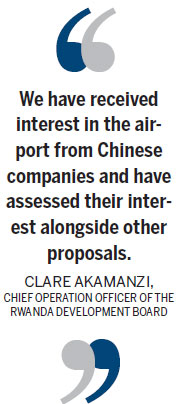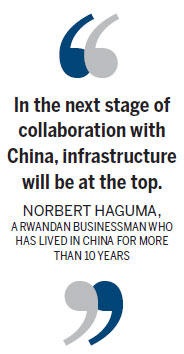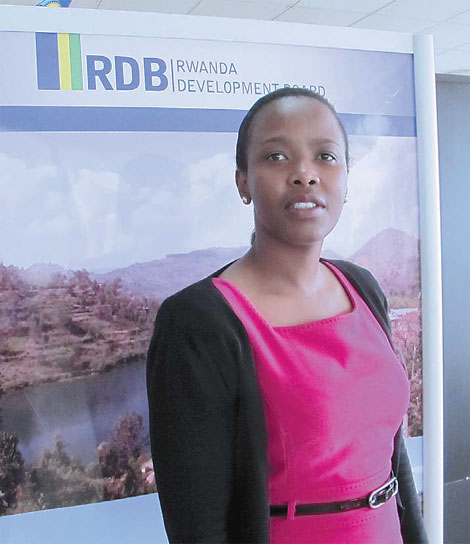Airports give Rwanda a ticket to growth
By Li Lianxing (China Daily Africa) Updated: 2015-01-30 10:39Aviation seen as way of breaking the shackles of a landlocked country
As a landlocked country, Rwanda's opportunities for expanding business are not quite as extensive as those enjoyed by other countries. One way of overcoming that is air transport, but the country, which has had robust economic growth over the past few years, is hobbled by a lack of aviation infrastructure.
"The aviation industry is critical to Rwanda," says Clare Akamanzi, chief operation officer of the Rwanda Development Board.
|
Clare Akamanzi, chief operation officer of the Rwanda Development Board, says the aviation industry is critical to her country's economic progress. Provided to China Daily |
"Not only does it connect Rwanda to the rest of the world, but it also facilitates the growth of many of the strategic sectors identified for economic development."
Rwanda is also limited in the industry it can develop because of geographic and land constraints. But it has identified several industries, including information technology, conferences and tourism, that it feels have great potential.
"The key sectors we are promoting are services, particularly tourism," Akamanzi says. "We receive more than 1 million tourists a year, compared with fewer than 100,000 a decade ago. This has been very much enabled by the substantial growth in air transport.
"We are also positioning ourselves as a services hub for distribution and logistics as well as sectors such as information technology and financial services. To become a hub, Rwanda is relying on further growth of both passenger and cargo aviation."
To compete against the aviation neighborhood's big guns, Ethiopian Airlines and Kenyan Airways, Rwanda has launched a national carrier, Rwandair. It flies to more than 15 African cities and Dubai. It also has three flights daily to Europe. Kigali International Airport serves as an aviation hub connecting the country to eastern and central Africa, and with flights to other African cities and the Middle East, it is also being used by international airlines.
The airport has expanded in recent years, and it now has an annual capacity of 1.6 million passengers; it was 600,000 before the airport was expanded, work that included building new terminals, gates and a lounge.

"Rwanda is a unique country allowing all African passport holders to arrive by air visa-free, Akamanzi says. "Visas are issued on entry, and that has made travel to the country easy."
The airport is now among the best in Africa, she says.
"It has been ranked No 7 in Africa and the best airport in East Africa by Skytrax, a UK-based consultancy firm."
However, as proud as Akamanzi is of the expanded airport, it is not regarded as having the capability of helping the country fulfill its development ambitions, and a new airport is in the pipeline.
That airport, at Bugesera, 40 kilometers from Kigali, will be world-class, Akamanzi says.
"It will provide both extra capacity for passenger transport and will develop cargo freight. Expanding Kigali International Airport was a temporary solution; Bugesera is the permanent solution."
For a long time funding of infrastructure projects has remained a key obstacle for African countries, and they are now trying to diversify funding sources to gain more independence and flexibility. The Rwanda Development Board says design of the new airport is complete and the government is seeking a private investor to help it build the airport.
"We have received interest in the airport from Chinese companies and have assessed their interest alongside other proposals," Akamanzi says.
China has had a significant role in construction work in Rwanda, and many landmarks in Kigali were built by Chinese companies.
Chinese companies have invested in transport network projects including roads and railways that are being built in a drive toward regional and continental integration, which in turn is aimed at opening up markets.
"Through regional integration, we are investing in strategic infrastructure projects such as the regional railway project from Mombasa in Kenya to Kigali," Akamanzi says.

"We are strategically positioned to access the East African market of more than 130 million people."
China has built many airports in Africa, including in Gabon, Kenya and Nigeria, and more project contracts are expected to flow their way as they build up their expertise and reputations.
"China's infrastructure projects in Rwanda are mainly in construction and manufacturing," Akamanzi says.
The country has benefited from Chinese investment through job creation and employment and infrastructure development, she says, adding that a World Bank study found that Chinese businesses have created about 3,000 jobs there.
However, Norbert Haguma, a Rwandan businessman who has lived in China for more than 10 years, says China's future infrastructure investment needs to be more intelligent.
"We are entering a new era of development in Africa. African countries like Rwanda have been focused on capacity building for the past 20 years. They invested heavily in stability, education and governance among other things as a prerequisite for the massive infrastructure investment that we are seeing today. That's what makes them such good investment destinations now.
"Anyone visiting Kigali will be impressed by the security, cleanliness and government efficiency. In education for example, Rwanda went from one university in 1994 to 27 today."
For the country to make full use of its potential, its skills need to be harnessed with new projects and investment, he says.
"In the next stage of collaboration with China, infrastructure will be at the top. That's why there is a growing need for collaboration in management, skills development and technology transfer, to make this investment more sustainable and beneficial to both."
lilianxing@chinadaily.com.cn
(China Daily Africa Weekly 01/30/2015 page8)







